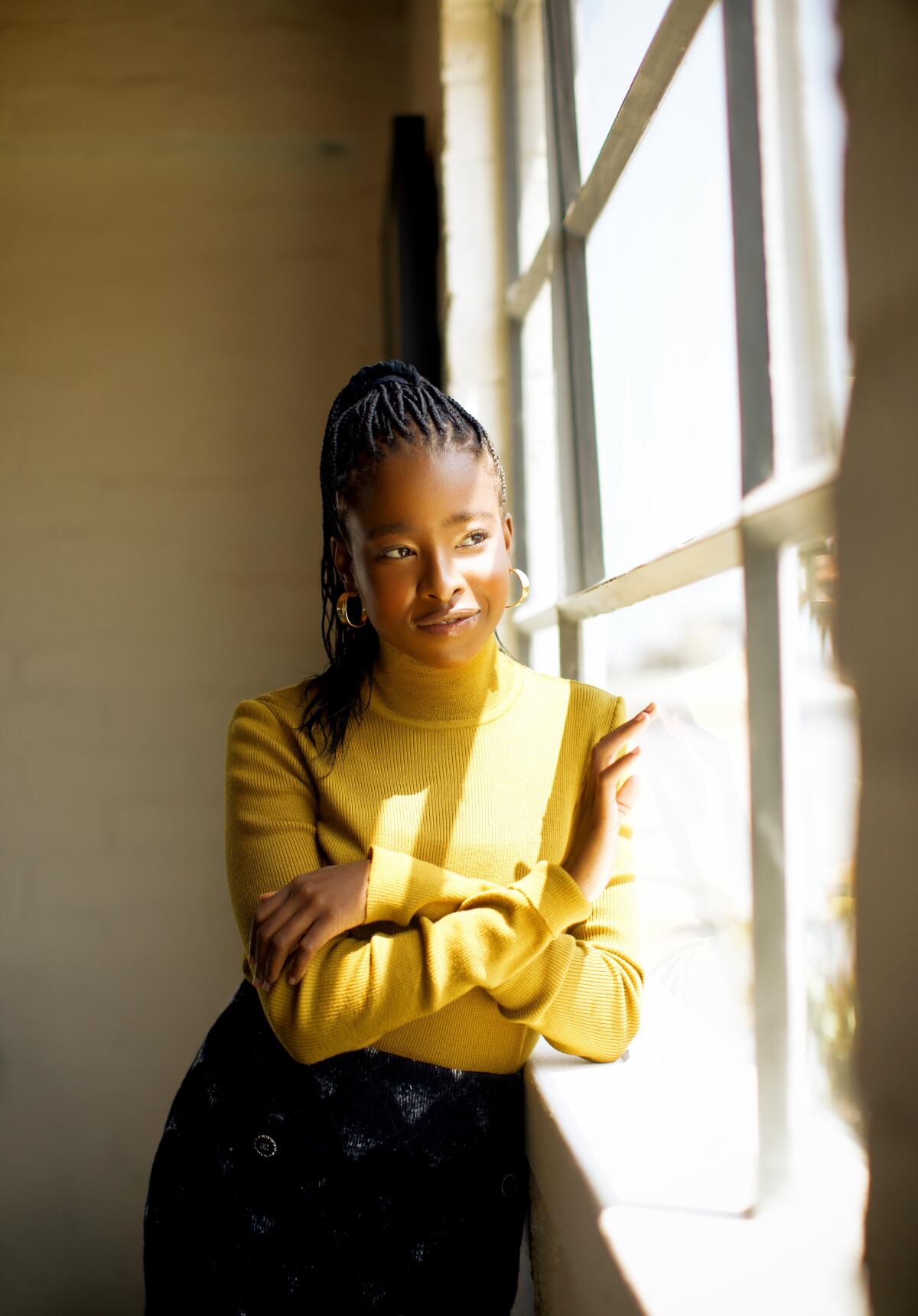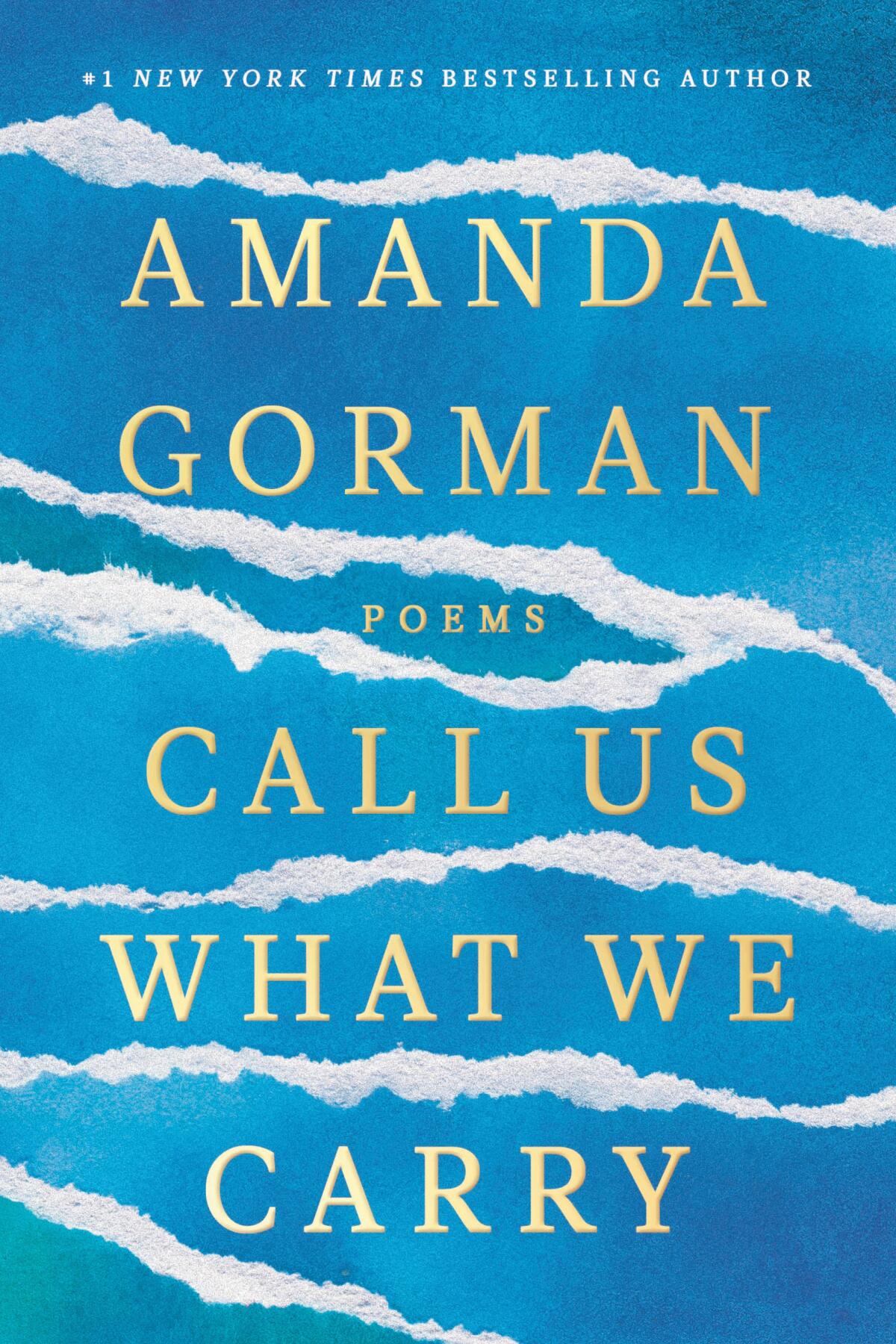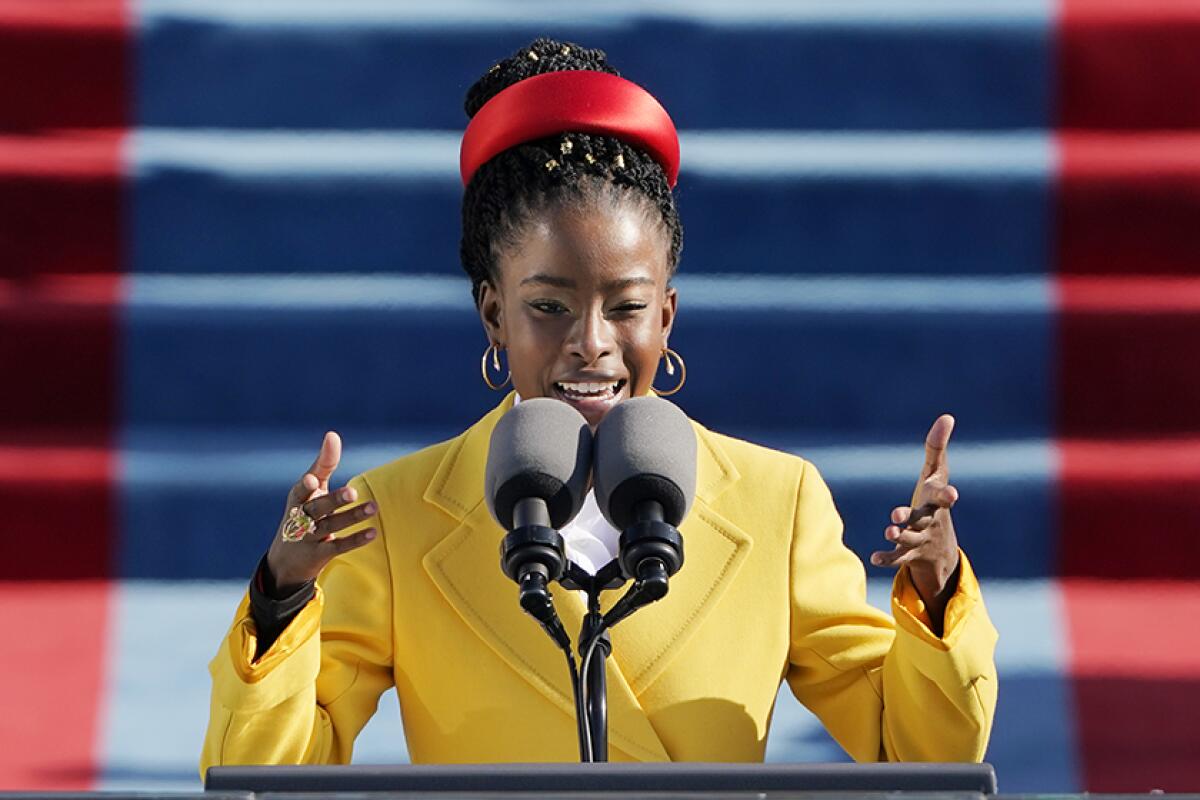Sign up for our Book Club newsletter
Get the latest news, events and more from the Los Angeles Times Book Club, and help us get L.A. reading and talking.
You may occasionally receive promotional content from the Los Angeles Times.

Amanda Gorman’s latest poetry collection pierces the pandemic’s silence and isolation, speaking to our collective grief in a confounding historical moment.
We began to lose words
As trees forget their leaves in fall.
The language we spoke
Had no place for excited,
Eager, laughter, joy,
Friend, get together.
These lines take the shape of nesting text messages in the early pages of Gorman’s “Call Us What We Carry” and reach for intimacy across unfathomable distances.
Her volume is the quintessence of the young Los Angeles poet, who strode to a lectern at the U.S. Capitol on Inauguration Day 2021 and reminded us, for a glorious moment, what the other side of sorrow felt like.
The United States’ first national youth poet laureate, 24-year-old Gorman casts a generous, restorative light in “Call Us What We Carry.” Nevertheless, she does not shy from critical struggles with racial and social inequity and the ever-worsening climate crisis.
“I saw how important it was to tell the truth about what was going on and to believe that telling our stories is a significant part of how we move forward,” Gorman says ahead of her April 23 appearance at the Los Angeles Times Festival of Books.

What the poet has revealed are the many ways these many months have marked us and that we, like the poems on the page, embody what we now hold.
Creating these pieces was a way to stretch, even twist, herself.
“It was an exploratory act on my part because a lot of people think of me as a spoken-word artist, which I am, but I also think that there is something special about the written word and what you can do with printed text,” she says. “So I wanted to lean into that specific playground, when you can make images and play with fonts and size and color. That was more me trying to get back to my roots as a written-word poet.”
Gorman is grateful for those sturdy roots. Born and raised in Los Angeles before studying at Harvard, she praises the playgrounds that have been instrumental in shaping who she’s become.
She recalls poetry workshops on Saturdays at Beyond Baroque, Venice’s venerable cultural center. “I remember taking the bus or walking or whatever it took to get there,” she says. “It was forever teenagers eating carrots and sunflower seeds, but it was such a special place. So many of my formative poetic moments happened there.”
Another touchstone, WriteGirl, enabled her to visualize what it meant to be a writer.
“I remember my first workshop … because part of their model was letting young girls partner with mentors. The first event I went to was at the [former] L.A. Times headquarters. I was so blown away. They had journalists there, and honestly, it was like Writers Disneyland. And the Festival of Books? I went for the first time when I was 8 … and it was like one of the best days.”

Like many braving silence and seclusion during 2020, Gorman had to adjust to an altered terrain — interior and exterior. The time away from her routines required her to connect with the city in a different way. Sealed away from friends and family, the city began to feel like a memory.
“I was used to, you know, maybe a nice weekend going to the beach with family and friends — and now the beaches were closed, so that wasn’t necessarily available. So it forced me to take other avenues. It’s forced me to understand L.A. on different terms. Be more with nature and quiet and solitude and letting those pockets have their own kind of space in my reckoning of the city.”
“Call Us What We Carry,” the April selection of the Los Angeles Times Book Club, is an elegy to that lost time and the fragility of language, when emotions had not quite caught up with thought or action.
She responded to the uncertainties of the pandemic, churning political unrest and a painful racial reckoning by reaching for varying forms of verse — erasure poems, shape poems and interrogations of captivating archival finds — that open up the page and the mind.
“When I first started writing it, I tried to lay out a manifesto of what I wanted to at least attempt to do,” Gorman says, “which is to try to poeticize the experience of the last two and a half years — the pandemic and everything else in the world that manifests.”
Corralling stray thoughts, she opened her iPhone and tapped fragments, images and questions into the Notes app. “It’s what eventually became the poem that starts the book, called ‘Ship’s Manifest.’”
It is, she writes, an accounting — “the poet’s diagnosis” — of what we bear.
Interacting with older texts and rubbing away to unearth new themes was a way to have conversations over time. In this fashion, what’s revealed “is not necessarily solely by me.” An exquisite example is Gorman’s interaction with the century-old journal of a Black U.S. Army corporal named Roy Underwood Plummer. Gorman explains that Plummer served in France in Company C of the 506th Engineer Battalion, which built roads and fortifications and conducted other manual labor. Gorman leans into Plummer’s “clear-cut” prose, documenting war and the dawning edges of the 1918 influenza outbreak.
“When I first started writing this, I knew that I wanted in some way, shape or form to engage with historical text,” she says. “It just took me a little bit of time to figure out what text worked and for what moment.”
“I remember reading “DMZ Colony” by Don Mee Choi, in which she kind of imagined what diary entries would look like for Korean children who’d grown up during the [Korean] War. I found that approach fascinating, and so when I came across Corporal Plummer’s diaries, digitized by the National Museum of African American History and Culture, I thought it would be an interesting way to have a conversation back and forth with time.”
Gorman uses form as prism — both as mirror and as window. Similar to the erasure texts, which are a reflection of two merged interiors, the shape poems take the form of the subject matter — a whale, a vessel, a face mask, a planet.
Although her words may have come in their own time, Gorman showed up, no matter what. “I don’t think necessarily my practice changed, but my purpose did.”
In time, she says, her work became more urgent, more honest. “I was taking a lot more baggage into the writing room than I ever had in any other time in my life,” she says. “But my writing space became a lot more sacred and special.”
Gorman says every line of “Call Us What We Carry” was an attempt to close distance, to connect from afar.
“I really wanted my love for you, the reader — even if I’ve never met them — to be felt through those pages,” she says. “I wanted to help make the burden be more carryable.”
Journalist Lynell George is the author of “A Handful of Earth, a Handful of Sky: The World of Octavia E. Butler.”
What: Amanda Gorman discusses “Call Us What We Carry” with Orange County Poet Laureate Natalie J. Graham at the Festival of Books.
When: 11:30 a.m. April 23
Where: The L.A. Times Main Stage at USC.
Admission: Free
Info: The full festival schedule is online.
Book club newsletter: Join our community book club and get the latest news about events: latimes.com/bookclub
Sign up for our Book Club newsletter
Get the latest news, events and more from the Los Angeles Times Book Club, and help us get L.A. reading and talking.
You may occasionally receive promotional content from the Los Angeles Times.